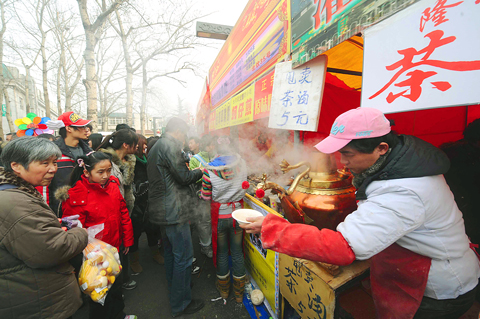China tightened rules on personal and working capital loans to prevent them from being used for speculation after credit growth and asset prices gained.
Lenders should not “over-grant” the loans that companies use to finance goods and services and must reasonably calculate their “real demand,” the China Banking Regulatory Commission said in a statement on Saturday. The rules took effect on Feb. 12.
The tightening reflects concern that funds might have been diverted to stocks and property, raising the risk of asset bubbles and bad loans. Banks extended 19 percent of this year’s 7.5 trillion yuan (US$1.1 trillion) lending target last month and property prices rose the most in 21 months.

PHOTO: AFP
The regulator will punish lenders that freely distribute working capital loans and companies that use such loans for purposes such as capital expenditure, stake investment and some other areas that the government doesn’t allow, the commission said.
China took the second step in a month to restrain inflation and damp asset prices by ordering lenders on the eve of a weeklong holiday to set aside larger reserves. The benchmark Shanghai Composite Index has declined 7.9 percent this year to 3,018.13 on Feb. 12, before the reserve-ratio announcement.
Commission chairman Liu Mingkang (劉明康) said in an opinion piece last month that bank loans had been channeled into stock and property markets and the watchdog “stepped in to stop that.”
China tightened rules on loans for homes, automobiles, fixed-asset investments and working capital to limit speculative flows.
The commission said advances exceeding 300,000 yuan fore personal loans would be given directly to the borrower’s counterparty, rather than the borrower. The rules also took effect on Feb. 12.
Banks will be barred from issuing personal loans without identifying the intended use and they must meet the borrowers in person before granting credit to avoid fraud, the commission said.
Draft rules were announced in July and October.
Separately, foreign direct investment in China climbed for a sixth month as the effects of the financial crisis faded. Investment rose 7.8 percent from a year earlier to US$8.13 billion, the Ministry of Commerce said in a statement on Saturday. The gain compared with a doubling in December.
Foreign direct investment in China started to climb in August last year after falling for 10 straight months because of the global financial crisis.
China’s US$90.03 billion total for last year was 2.6 percent less than in 2008, according to commerce ministry figures released last month.
The country’s outbound non-financial investment was US$2.36 billion, the ministry said, without giving a year ago comparison.

Taiwan’s foreign exchange reserves hit a record high at the end of last month, surpassing the US$600 billion mark for the first time, the central bank said yesterday. Last month, the country’s foreign exchange reserves rose US$5.51 billion from a month earlier to reach US$602.94 billion due to an increase in returns from the central bank’s portfolio management, the movement of other foreign currencies in the portfolio against the US dollar and the bank’s efforts to smooth the volatility of the New Taiwan dollar. Department of Foreign Exchange Director-General Eugene Tsai (蔡炯民)said a rate cut cycle launched by the US Federal Reserve

The US government on Wednesday sanctioned more than two dozen companies in China, Turkey and the United Arab Emirates, including offshoots of a US chip firm, accusing the businesses of providing illicit support to Iran’s military or proxies. The US Department of Commerce included two subsidiaries of US-based chip distributor Arrow Electronics Inc (艾睿電子) on its so-called entity list published on the federal register for facilitating purchases by Iran’s proxies of US tech. Arrow spokesman John Hourigan said that the subsidiaries have been operating in full compliance with US export control regulations and his company is discussing with the US Bureau of

Pegatron Corp (和碩), a key assembler of Apple Inc’s iPhones, on Thursday reported a 12.3 percent year-on-year decline in revenue for last quarter to NT$257.86 billion (US$8.44 billion), but it expects revenue to improve in the second half on traditional holiday demand. The fourth quarter is usually the peak season for its communications products, a company official said on condition of anonymity. As Apple released its new iPhone 17 series early last month, sales in the communications segment rose sequentially last month, the official said. Shipments to Apple have been stable and in line with earlier expectations, they said. Pegatron shipped 2.4 million notebook

Businesses across the global semiconductor supply chain are bracing themselves for disruptions from an escalating trade war, after China imposed curbs on rare earth mineral exports and the US responded with additional tariffs and restrictions on software sales to the Asian nation. China’s restrictions, the most targeted move yet to limit supplies of rare earth materials, represent the first major attempt by Beijing to exercise long-arm jurisdiction over foreign companies to target the semiconductor industry, threatening to stall the chips powering the artificial intelligence (AI) boom. They prompted US President Donald Trump on Friday to announce that he would impose an additional